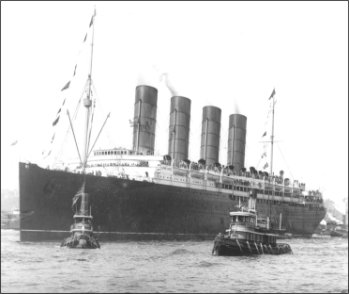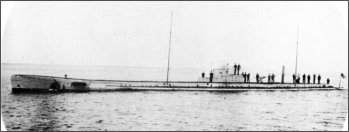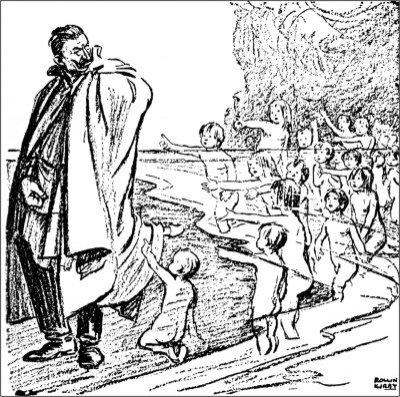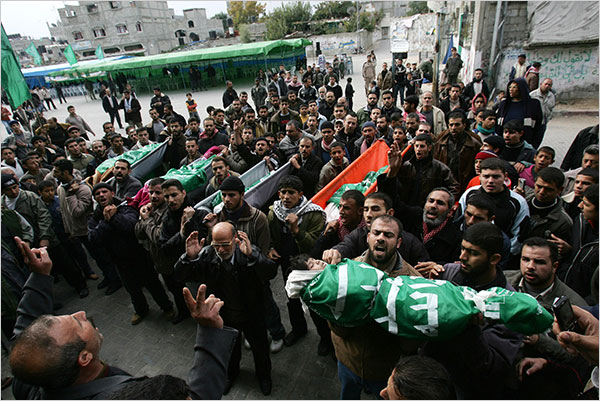Annals of Propaganda
Civilian Deaths: From 'Murder' to Mere 'Sore Point'
[Notes: This essay references four NY Times articles dated May 8, 1915,
Dec. 28 and 29, 2008, and Feb. 4, 2009. It also includes a 1915 political cartoon
from the New York World relevant to the subject. They are all appended.
The main reference for the facts surrounding the sinking of the Lusitania is the book by Thomas A. Bailey and Paul B. Ryan, The Lusitania Disaster, The Free Press, Div. of Macmillan Publishing Co., Inc., New York 1975.]
 t has long been a contention of this website that:
t has long been a contention of this website that:
…states pursue national objectives amorally and immorally and when they invoke morality it is merely as propaganda and for the most cynical of motives.
This was the conclusion arrived at by comparing Israel's treatment of the memory of Anne Frank and that of Olga Benario, both of whom were Jews who died in Nazi concentration camps.
Further support for the correctness of the contention is provided by comparing the official reaction of the United States to the civilian deaths caused by its military operations in Afghanistan and by those of its client state Israel's operations in Gaza to its reaction to the sinking of the British passenger liner Lusitania as a result of German naval operations in World War I.

Wikipedia
The British liner Lusitania arriving in New York during her maiden voyage, 13 September 1907 |

The Lusitania Disaster
The German U-boat, U-20, which sank the Lusitania on May 7, 1915. Its specifications were: length: 210 ft.; beam: 20 ft.; max. dive depth: 164 ft.; max. speed: surfaced 15.4 kts, submerged 9.5 kts.; crew: 31 enlisted men and 4 officers. It was placed in service on August 5, 1913. |
Historical Background
World War I began in August 1914.The principal belligerents were the Allies: Britain, France, and Czarist Russia versus the Central Powers: Germany, Austria, and Turkey. Russia was effectively taken out of the war by the revolution of February 1917. The US entered the war on the side of the Allies on April 6, 1917. The war was ended by an armistice between all the belligerents on November 11, 1918. The outcome of the war was determined by the Versailles Treaty which was signed on June 28, 1919 and which dismembered and disarmed Germany. Among other things, Britain acquired control of most of the former Turkish Ottoman Empire which included the valuable prize of the oil-rich Middle East.
At the time of the US entry into the war it was justified to the American people as a noble "war to end all wars."
At the beginning of the war, on November 3, 1914, Britain, on the basis of its superior surface navy, declared the North Sea, Germany's only access to ocean commerce, a war zone with the intent of "starving out" Germany. Strategically, it cut Germany's trade with the United States to zero while the US became the major supplier of war materiel to Britain.
On February 4, 1915, Germany, relying on the superiority of its submarines, retaliated by declaring the seas surrounding the British Isles "an area of war."
On May 1, 1915 at 12:30 PM, the Lusitania, a fast passenger liner launched on June 7, 1906, built with a large subsidy from the British government, and owned by the British Cunard Steamship Company, left New York bound for Liverpool, England with 1,959 persons aboard.
On April 30, the U-20, commanded by Lieutenant Walter Schwieger, acting on orders from the German Admiralty to interdict "expected large troopship movements" in the vicinity of "Liverpool, the Bristol Channel, and Dartmouth," left its home port of Emden and headed for the channel between Ireland and England via the northern route around the British Isles.
The U-20 passed the Orkney Islands on May 2 and was on station in the Irish Channel between Ireland and England on May 7. At 1:20 PM, while surfaced, a lookout spotted the four stacks of the Lusitania 13 miles distant. The U-boat submerged and immediately took up a course at its maximum submerged speed of 9.5 knots to bring it within good torpedo firing range of the liner. The commander then turned the boat so that the liner would pass directly in front of it at a distance of 765 yards. At the torpedo's speed of 22 knots, the time of travel was 62 seconds. At 2:10 PM, leading his target by about 612 yards, the commander fired a single torpedo which struck its target near one of its boiler rooms, setting off a violent secondary explosion.
The Lusitania sank in 18 minutes.
The U-20, to avoid the destroyers which were expected to arrive shortly, dove from periscope depth to 79 feet and headed for open waters. It returned to the naval base at Wilhemshaven on May 13.
Of the 1,959 persons aboard the liner, 1,198 perished, of which 128 were Americans whose country was officially neutral, but who were on a ship of a belligerent power sailing in a declared "area of war." Their government had declined to issue a warning to its citizens about travel on the ships of belligerent states.
Press Reaction To The Sinking Of The Lusitania
On May 8, 1915, the New York Times published a summary of the New York press reaction to the sinking. The summary is appended in full. The Times itself called it a "crime against civilization." The word most often used in the press to characterize the event was "murder."
Afghanistan
Anglo-American forces invaded Afghanistan on October 7, 2001. The UN Secretary General, Ban Ki-moon, is currently visiting the country and a report in the NY Times for February 4, 2009 is headlined: Ban Ki-moon Urges Fewer Civilian Deaths in Afghanistan. The strongest condemnation for the civilian deaths the Times can come up with is that they are a "sore point."
Gaza
Israel's recent military operation in Gaza killed about 1300 civilians, most of them non-combatants. On the third day of the operation, December 28, 2008, when the death toll stood at about 350, the Times reported then Whitehouse Press Secretary, Gordon D. Johndroe, as saying that Israel was perfectly justified in defending its people against "terrorists like Hamas." Without distinguishing between Hamas and the people of Gaza, the Times reported, without comment, Johndroe as saying, "These people are nothing but thugs."
As in the case of US military operations in Afghanistan, the use of the term "murder" to characterize the civilian deaths caused by Israel in Gaza is inconceivable.
Conclusion
The death of innocent civilians caused by the German sinking of the Lusitania within an overall program of the German state pursuing its national goals by military means is exactly analogous to the deaths of innocent civilians in Afghanistan and Gaza as the US and its proxy, Israel, pursue their national goals by the same means. The only difference is the reaction by the US and its media to those deaths. In the former, the perpetrator was Germany, a country which the US would soon declare war on. In the latter, the perpetrator is the US itself and its proxy.
The inescapable conclusion is the statement which appears at the beginning of this essay:
…states pursue national objectives amorally and immorally and when they invoke morality it is merely as propaganda and for the most cynical of motives.
![]()
Then…

The New York World 1915
The ghosts of the children who died in the sinking of the Lusitania haunt the Kaiser. [This cartoon did not accompany the NY Times press summary.] |
![]()

May 8, 1915
Press Calls Sinking of Lusitania Murder
Editorials in New York Newspapers Agree Torpedoing Was Crime Against Civilization
Editorial opinions in New York newspapers this morning regarding the torpedoing of the Lusitania by the Germans were as follows:
The Slaughter of Neutrals and Non-Combatants
From The Herald
The civilized world stands appalled at the torpedoing of the Lusitania, with the terrible loss of life—noncombatants, many of them citizens of neutral countries.If ever wholesale murder was premeditated this slaughter on the high seas was. By official proclamation of an intention to disregard all rules of blockade and international law, Germany declared that her submarines would sink every ship that sought to enter or leave the ports of the United Kingdom and France. By official advertisement signed by the Imperial German Embassy at Washington all passengers were warned not to take passage on British ships from the United States for England. By letter and telegram passengers were warned not to go by the Lusitania. The ship had been marked for slaughter. The warnings were disregarded, but she was doomed from the minute she passed out of the three-mile limit.
There may be a thousand dead, there may be fifteen hundred. The extent of the disaster matters little in an international sense. One American life lost makes another case against Germany similar to that of the Gulflight. But undoubtedly hundreds of Americans have been sent swirling to eternity by the German pirates.
Henceforth is international anarchy to be the controlling factor in marine warfare? Henceforth is piracy on the high seas to be recognized and go unprotested and unpunished? Henceforth is wanton murder of neutrals and non-combatant passengers to be treated as regrettable incidents and [let] go at that?
It is for the neutral countries, and above all for the United States, to answer these questions. It is a time of gravity in American history unmatched since the Civil War.
This cold-blooded, premeditated outrage on a colossal scale will cause such a blinding white light of indignation throughout the neutral portion of the world, unhappily growing smaller and smaller, that there can not conceivably be in Washington any thought of turning back from the note to Germany, sent Feb. 10.
In the note the United States informed Germany that it viewed the possibilities with great concern and requested Germany to consider the critical situation which might arise were the German naval forces in carrying out the policy foreshadowed to destroy any merchant vessels of the nation or cause the death of American citizens.
"Or cause the death of American citizens!"
Again in this communication the State Department informs the German Government that if German commanders should destroy on the high seas an American vessel or the lives of American citizens, it would be difficult to view the act in any other light than as an indefensible violation of neutral rights.
"Or the lives of American citizens!"
The Lusitania was a British ship, but this fact does not mitigate the crime of the Kaiser's navy against this republic by killing peaceful American passengers. Nor does the fact that warnings were given mitigate the crime; it rather increases its enormity. Americans had the right to go by any steamship they chose. They also had the right to protection by this Government. No government can long last that does not protect its own citizens.
The grave crisis which was precipitated by the torpedoing of the Gulflight grows greater each hour as the tidings from Queenstown swell the list of the dead.
Calls It Unqualified Piracy.
From The Journal of Commerce.
The attack on the Lusitania was not war, it was simply attempted murder on a scale deliberately intended to inspire general consternation and fear; It was not the work of the naval force of a power bound by the conventions of law and humanity, it was plain and unqualified piracy.
The fact that it forms the climax of a long series of minor outrages, some of them from the neutral point of view still more lawless, merely increases the difficulty of the problem it presents. For Germany has made it sufficiently plain that she has merely contempt for the opinion of the rest of mankind when it runs counter to the dictates of her policy of savage reprisal. Clearly, nothing but the exercise of superior force can teach Germany to respect conventions heretofore sanctioned by the laws of nations, and with any protest of ours on this or other cases of German naval outrage, must arise the question of how much force we hold in reserve.
One thing may be accepted as certain: the American temper will not indefinitely endure these intentional outrages.
The Sinking of the Lusitania
From The World
Morally, the sinking of the Lusitania was no worse than the sinking of the Falaba.
In each case a passenger ship carrying neutrals and non-combatants was destroyed by a German submarine, and hundreds of helpless men, women, and children left to float or drown, as luck decreed. The destruction of the Lusitania makes a more dramatic appeal to the human imagination than did the destruction of the Falaba, but both were crimes against civilization in equal degree.
It is no fault of the German Government that anybody escaped from either ship. It is no fault of the German Government that every American on board the Lusitania is not lying at the bottom of the sea.
The German authorities claim in extenuation that fair warning was given to Americans by the German Embassy at Washington that the Lusitania was to be torpedoed. The fact that A formally announces his intention to murder B at 3 o'clock tomorrow afternoon does not make the subsequent murder of B an innocent or a justifiable act.
What Germany expects to gain by her policy is something we cannot guess. What advantage will it be to her to be left without a friend or a well-wisher in the world? The war cannot last forever. Peace will eventually come, if only through exhaustion. What will be the attitude of the other nations toward Germany when the conflict is finished? How many decades must pass before Germany can live down the criminal record that she is writing for herself in the annals of history!
It has often happened that men in their desperation have become outlaws. But we recall no other instance in which a great nation has deliberately elected to become an outlaw. That is the tragedy of the insensate policy that the German Government is pursuing, and eventually the German people will pay a staggering price for their Government's folly. If the world is again to be ruled by barbarism, let it be a barbarism that does not masquerade as Kultur. Civilization might better perish than to survive on the terms that Germany offers mankind.
After Effects
From The Press
Aside and apart from the question of the legal right of the von Tirpitz Admiralty to destroy the Lusitania of any British vessel that is hauled down but cannot be carried off as a prize, it is well worth considering whether such a shock to the world, as well as provocation to the Allies, will in the end work more to the advantage of the Germans or of their foes.Grant that with every possible care taken to spare noncombatant life, there was nothing for the submarine to do but to destroy the huge trans-Atlantic liner, since there was no way to get her into a German port, it is not at all sure that the results will justify the daring of the undertaking and the success of its fulfillment.
The British race, like the Germans, is never terrorized by anything. The loss of the Lusitania is the loss of a ship; little ships and big ships the English lose through the generations in war and peace without dismay or even excitement. They do get from such misrape a more stubborn purpose and a stouter grip at their work.
Then there is the very probable effect upon Italy. She is more likely to be swept into this war by events which appear for the moment to make against the Allies than by events which appear to make for them. On an easy job in the war, Italy could not, after it was over, ask a great deal of reward. On what at least seemed a hard one, she would be entitled to and would receive a large prize. And it must be evident to any thoughtful consideration that, whether she goes in or whether she stays out of the war, Italy in the long run has scarcely less than France to fear from the triumph of the Teutonic alliance, ready to edge her into the sea.
As Americans
From The Tribune
For every American citizen one fact will stand out clear and beyond all else this morning. In defiance, not alone of every principle of international law, but of every dictate of common humanity, American men, women, and children, citizens of this neutral nation have been exposed to death, have, perhaps, been actually murdered by German war craft.For this murder there is no justification outside of that law of necessity paraded by the German Chancellor in the opening hours, when the first German regiments rushed through Belgium to consecrate at Louvain the work of German kultur. The passengers, the American citizens, who embarked upon the Lusitania were protected by every rule and precedent of international law. They journeyed to an unblockaded port, and, thus journeying, were entitled to the protection supplied by the rules of civilized warfare.
The vessel on which they sailed was a fair prize for German warships. German sea power was entitled to capture the Lusitania if it could, to sink her if necessity compelled, but not until every non-combatant was taken from her decks, not until the safety of every life had been assured. From this tragedy we shall now turn to Washington. More than a century ago, when this nation was weak and its people lacking in all the resourced of a great power, it made answer to the pirates of the Barbary Coast who asserted a prerogative less intolerable than that which is now asserted in Berlin and executed upon the high seas.
No voice will be raised, no effort will be made, to force the hand, to hasten the action of the President of the United States. But neither he nor any other official in our Government can mistake the temper in which their fellow-citizens will wait. They will wait with the casualty list in their hands. They will wait, fortified each day and each hour by new evidence and fresh details of the manner in which Americans, American women and children, have been exposed to death by German submarines. the nation which remembered the sailors of the Maine will not forget the civilians of the Lusitania!
Premeditated and Dastardly
From The Sun
It is proper to keep clearly in mind the fact that the undersea attack on the Lusitania is of less importance to us, as an event involving international relations, than the recent sinking of the Falaba; that is, if it shall happily prove true that all the American passengers who sailed a week ago today on the great Cunarder escaped with their lives. If, on the contrary, any American citizen died in consequence of the torpedoing of the Lusitania, the incident is in the class with the Falaba and technically possesses neither more nor less significance than that affair.Yet when all this has been said the fact remains that no episode of the war has startled and aroused public opinion in this country in greater degree. The moral and intellectual effect is bound to be tremendous beyond measurement. The size, speed, and renown of the vessel, the general interest in her movements and fate, the elaborately advertised warning published a week ago by the German Embassy, coincidentally with the Lusitania's last departure from the port of which she was the pride and favorite, combine to intensify the horror with which American opinion regards this German innovation on accepted methods of warfare at sea. That it was premeditated we know; that it was reckless of innocent non-combatant lives we are sure; and "dastardly" is the word on millions of American lips this morning.
![]()
…And Now
![]()

Ban Ki-moon Urges Fewer Civilian Deaths in Afghanistan
Filed at 5:44 a.m. ET
KABUL (AP) -- The U.N. chief urged U.S. and NATO-led forces in Afghanistan on Wednesday to prevent civilian casualties in their operations, echoing concerns of President Hamid Karzai who has increasingly voiced his anger over the issue.
Hundreds of Afghan civilians have died in attacks by the Taliban -- but also in operations by U.S. and NATO forces fighting the insurgents.
Speaking alongside U.N. Secretary-General Ban Ki-moon -- whose trip to Kabul was unannounced -- Karzai said he has publicly complained over civilian casualties in order to pressure U.S.-led forces into changing their tactics.
Ban said he shared Karzai's concerns, calling for closer civilian-military cooperation and urging foreign troops to ensure that civilians are not killed. He said there have been ''many tragic incidents.''
The U.N. chief's visit coincides with a renewed focus on the fight against militancy in the country by President Barack Obama's administration. It also comes at a time when foreign and Afghan forces are trying to reverse gains made by the Taliban, which has made a comeback after its initial defeat following the 2001 U.S. invasion.
The deaths have become a sore point between Karzai and western militaries. He has urged foreign military forces to show greater care in civilian areas and recently set a four-week deadline that expires this month for the U.S. and NATO to respond to his demand that Afghan forces play a larger role in military operations.
Ban said his visit underscores the priority the United Nations is placing on its work in Afghanistan, where the U.N. mission has been tasked with leading the civilian efforts of the international community in the country.
He planned to meet with the commander of the NATO-led troops and other Afghan and foreign officials, according to a U.N. statement.
Copyright 2009 The Associated Press

Gaza Toll Passes 350 in 3rd Day of Israel Strikes

Photo: Abid Katib/Getty Images
The bodies of five sisters killed during Israel's current campaign of air strikes using US F-16 aircraft on Gaza. The Gaza refugee camp has no air defenses. |
December 29, 2008
GAZA — In a third straight day of deadly airstrikes against the emblems and institutions of Hamas on Monday, Israeli warplanes pounded targets in Gaza, including the Interior Ministry, while in Jerusalem, Israeli Defense Minister Ehud Barak vowed “an all-out war on Hamas and its kind.”
Copyright 2008 The New York Times

White House Puts Onus on Hamas to End Violence
December 28, 2008
CRAWFORD, Tex. — As world leaders called on Saturday for an end to the Middle East violence, the Bush administration issued blistering criticism of Hamas, saying the group had provoked Israel’s airstrikes on Gaza by firing rockets into southern Israel.
Gordon D. Johndroe, a White House spokesman, said that Hamas, the group that controls Gaza, was responsible for the outbreak of violence and called its rocket attacks ”completely unacceptable. These people are nothing but thugs,” he said. “Israel is going to defend its people against terrorists like Hamas.”
Copyright 2008 The New York Times
